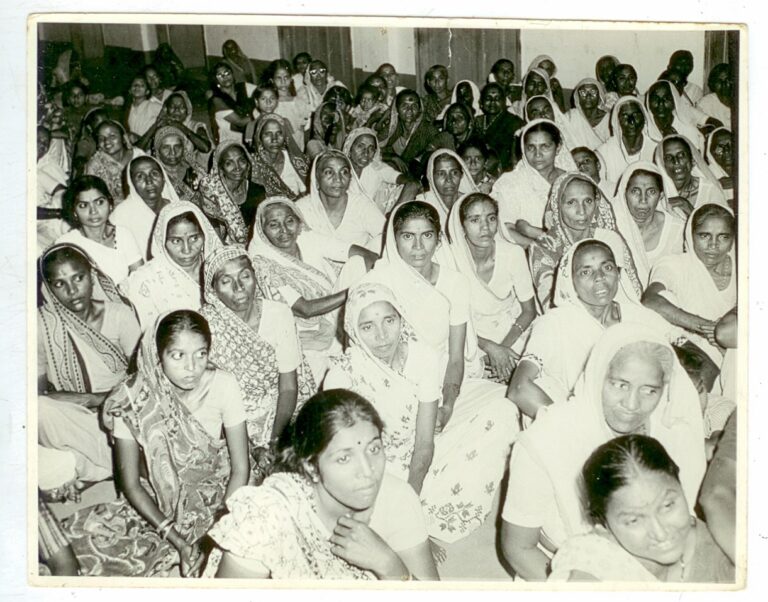

SELF EMPLOYED WOMEN’S ASSOCIATION (SEWA) is the single largest Central Trade union registered on 12th April, 1972 with a membership of over 2.9 million poor, self-employed women workers from the informal economy across 18 states in India.

We belong to the vast, unprotected working population of our country, who are considered informal workers. Although we constitute 93% of India’s labor force, few labor laws or social protection include us. Our significant contribution to the nation’s economy is largely uncounted, undercounted, or invisible.
We formed SEWA in 1972, in Ahmedabad. Today we are 2.9 million women strong. We are the single largest women worker’s Central trade union in India. At SEWA, we come together as poor, as women and as worker. The SEWA approach is to address the needs of the worker as a laborer, as well as a woman. This integrated and holistic view of workers has given birth to new and innovative ways to fight poverty and vulnerability.
Our goals are full employment and self-reliance.
Full Employment means work security, income security, food security, and social security, which includes health care, child care, insurance, pension, and housing at the household level.
Self-Reliance is the ability to work individually and collectively, to achieve economic freedom, and retain decision-making power over matters that concern our lives and livelihoods.
Our strategy is a joint action of union and cooperatives. Our union gives us strength, support and a voice. Our cooperatives nurture our lives and livelihoods. We have formed trade cooperatives for better income, skill upgradation, marketing, and access to credit. Asset ownership by women is our first step out of poverty. We have also built cooperatives to gain access to banking, healthcare, childcare, insurance, housing, and legal services. Such services are the safety net that protects us from falling into a spiral of vulnerabilities.
This is who we are, and this is what we do. And here are our stories….
With the Gandian principles of Satya (truth), Ahinsa (non-violence), Sarvadharma (integrating all faiths. all people) and Khadi (propagation of local employment and self-reliance), SEWA has been working for over 5 decades to improve the livelihoods of poor self-employed women workers from the informal economy, through various initiatives using technology, technical training, microfinance, market linkages, natural resource management etc. across over 125 different trades with the twin goals of
Achieve work security, income security, food security and social security viz. healthcare, childcare, nutrition and shelter and
Autonomous and self-reliant at both individual and community levels in terms of economic as well as decision making abilities.
To achieve its goals of Full-Employment and Self-Reliance for its members and to facilitate representation, economic empowerment, collective strength & increased bargaining power of its members, SEWA follows integrated approach of
This is done through the strategy of struggle and development. The struggle is against the many constraints and limitations imposed on them by society and the economy, while development activities strengthen women’s bargaining power and offer them new alternatives. Practically, the strategy is carried out through the joint action of union and cooperatives.
The union strengthens members’ leadership, their confidence, their bargaining power and their collective strength within and outside their homes and their representation in policy-making and decision-making fora.
The cooperative aspect supports the members by building their capacities – technical, enterprenuerial, managerial and soft-skills and in developing their own economic organisations – where members themselves are owner and managers of their own enterprises. Our experience shows that the foundation for development of women is stronger if it is built on four core pillars of
On these lines, SEWA has facilitated organizing its members in to their own 4813 SHGs, 160 cooperatives, 15 economic federations and 3 producer companies.
For a better future of work, there is a need to strengthen the scaling-up of these worker-owned and managed tiny and microenterprises, which will throw up ample employment and work opportunities for workers in the informal economy.
Given its experience in organizing informal sector women workers and facilitating their economic empowerment, SEWA is being looked upon as a resource organization at national as well as international level. The best practices and the success of the SEWA’s sister-to-sister organizing model which builds the collective strength and bargaining power of women workers; by organizing them into different forms of economic organizations; is replicated in various trades, sectors as well as in countries across the region and globe.
The replication and the upscaling is done by SEWA in affiliation with various stakeholders such as Governments – State, National and International, SAARC, National and International Trade Unions, Multi Lateral Organizations etc. On these lines SEWA has worked towards strengthening the livelihoods of poor self employed women workers in 7 South-Asian countries viz Afghanistan, Pakistan, Sri Lanka, Nepal, Myanmar, Butan and Bangladesh